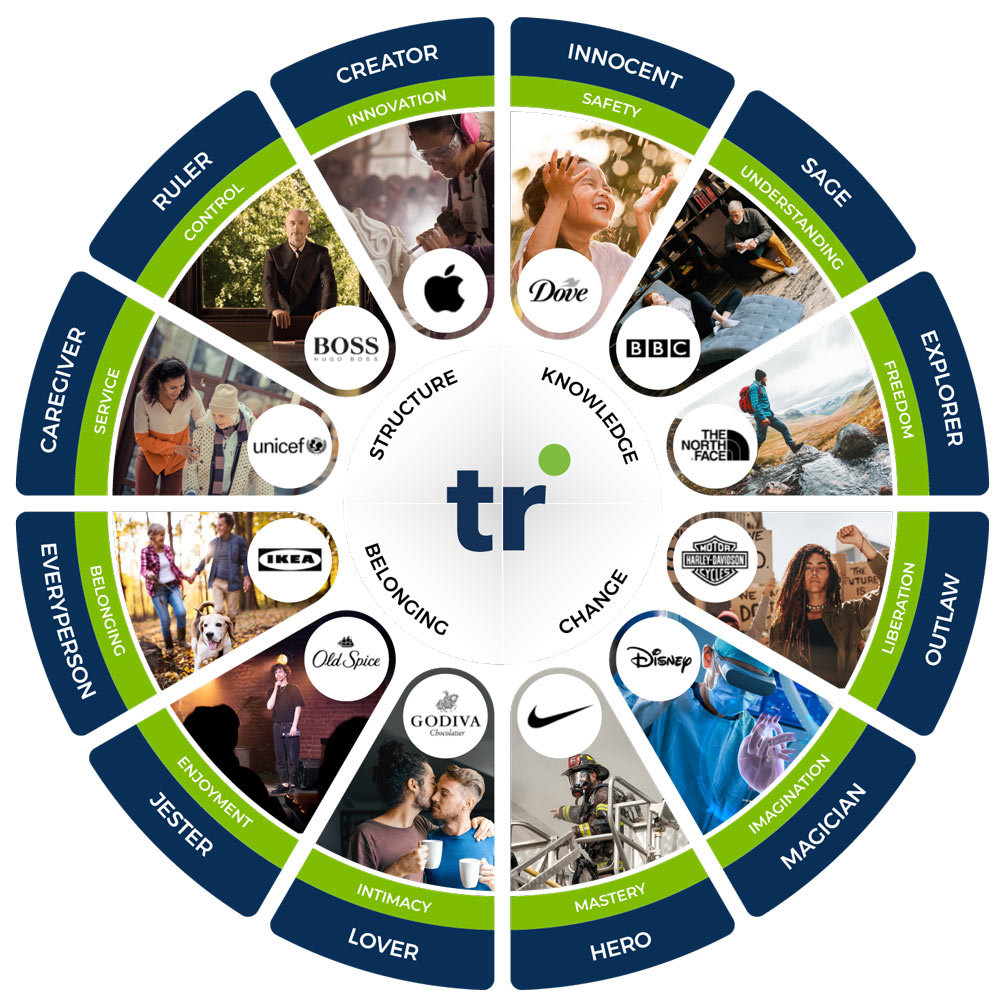Archetypal Branding Series: Volume One
What’s Your Story?
The Transformational Power
of Archetypal Branding

Brian Fallers
The Challenge of Modern-Day Brand Marketing
The digital ecosystem. Web3. Social media optimization. Martech. Social selling. Artificial intelligence. Augmented and virtual reality. And that’s only the tip of the iceberg. As new technologies evolve and further disrupt the customer experience, there’s one certainty – your brand experience matters more than ever. In this age of commoditization and social commerce, winning on price and product alone is no longer enough to guarantee success. Successful companies have a firm understanding that customer loyalty and sustainable growth is obtained by having a strong and transparent brand identity, i.e., having an identity driven by sincere values that are in line with the hopes and aspirations of their customers. At their core, brands are very similar to people and marketing-savvy and culture-centric companies know that the best way to a consumer’s heart and mind is through an authentic, trusting and emotionally connected brand story.
Your brand is your truth.
Authentically defined, it instills a sense of trust while reinforcing your organizational values’ brand promise. Carefully crafted, it takes people on a journey that allows them to discover who you are and exactly what it is that makes you special.
Your brand is your foundation.
Strategically designed, it provides the framework for decision making. It serves as a guide for the content and structure of your communications so that your story is conveyed in a way that is both honest and reliable.
Your brand is your livelihood.
Creatively developed, it’s able to disrupt the competitive landscape, connect with prospective customers and build lasting relationships. It creates an emotional connection with your audience through masterful storytelling and a blend of creative artistry and marketing science, inspiring consumers to take a leap of faith, remain loyal brand enthusiasts and share their experiences with others.
This is where archetypal branding excels. It focuses on delivering a proven branding methodology grounded in behavioral science and creative artistry, founded on great storytelling and an approach that transcends culture and time.
What is Archetypal Branding?
As consumers, our relationships with brands are largely transactional (a product or service attained in exchange for money). However, there are certain brands that we tend to be sentimental towards – some of which we love and can’t live without. It could be an affinity for Nike with its iconic swoosh and inspirational messaging. Perhaps it’s the joy of driving a Mercedes or the connection you have with your Louis Vuitton handbag. Welcome to the power of archetypal branding.
Be it Shakespeare, Poe, Whitman or Hemingway, authors have earned themselves a place in history via great storytelling and memorable literary characters. Fast forward to today, many TV and movie characters have become a vital part of our lives and become modern-day icons. Over the decades, the likes of Indiana Jones, Walter White, Scarlett O’Hara, James Bond, Daenerys Targeryen and Vito Corleone have captured our hearts and imaginations. The same can be said about companies that take on similar qualities and incite the same powerful emotions as these memorable characters.

arch e type
[är-ki- tīp]
A symbol, theme, setting, or character-type that recurs in different times and places in mythology, literature, folklore, dreams, and rituals so frequently or prominently as to suggest (to certain speculative psychologists and critics) that it embodies some essential element of “universal” human experience.
The Concise Oxford Dictionary of Literary Terms

The 12 Brand Archetypes
Archetypal branding is as old as storytelling itself and based on Swiss psychiatrist Carl Jung’s research that universally inherited ideas, thought patterns and images are present in the collective subconscious of all human beings. As used in marketing and advertising, the term “archetype” is based on Jung’s theory that consumers have an innate tendency to use this symbolism to understand concepts and that the subconscious plays a role in deciding which advertising messages we retain. Archetypal images are characters that represent deep fundamental human needs and desires and have often been used by the advertising industry to subtly persuade consumers to purchase their products or services.
Marketing-savvy companies have found that identifying the archetypes that symbolize their own brand identity (and more specifically their culture) is a game-changer in delivering a more authentic, consistent, consumer-connecting and differentiating brand experience. Jung detailed 12 universal archetypes that corresponded to a range of human motivations with each archetype serving as a character trait that’s emotionally hardwired into our minds. And it’s likely your latest purchase was influenced by archetypal branding.
Archetypal branding is not a new brand development tool. Since the 1950s, many leading brands have used this process as a means of creating an emotional connection with consumers. Notably, the introduction of the Marlboro Man as an outlaw figure was designed to symbolize independence, defiance, adventure and authenticity. The character has since become a marketing icon due to its large appeal to both men and women as well as its connection to the American West and popular cowboy films of the time. The birth and emergence of the internet in the 80s and 90s disrupted marketing significantly. As commoditization overwhelmed the marketplace, many companies sought a different method to create a more emotionally compelling brand identity – a story and face that was not only authentic to their culture and values, but one that would connect better with their target audiences. The world wide web created a new marketing “battlefield” where brands no longer competed purely on price but rather on storytelling and brand appeal. The likes of Nike (the epitome of the Hero archetype), Apple (Creator archetype), Disney (Magician archetype) and Harley Davidson (Outlaw/Rebel archetype) and others emerged stronger than ever, driven by emotionally connected brand stories. It is not a coincidence that these powerful and world-renowned brands continue to dominate their respective markets. By building brand experiences, brand symbols and brand stories anchored by their archetypal DNA, they continue to find new and innovative ways to emotionally connect with consumers, all while staying true to their culture and values.
Carl Jung
Pioneer of Archetypal Process
The Truelio Brand Story
We invite you to read our brand story and how our Hero, Everyperson and Magician archetypal branding DNA shaped the Truelio brand identity. Whether you’re considering a rebrand, looking to enhance your online experience or creating a marketing campaign, contact us today to learn how we can help deliver a dynamic and memorable brand experience that’s authentically yours.
How Truelio’s Archetypal Branding Process Can Help You
At Truelio, we believe that a great, memorable and inspiring story is the foundation for an incredible brand experience. In today’s marketing world, experience is everything and your brand archetypes are the glue that holds your customers and your employees together. Our interactive brand process involves a range of activities designed to facilitate great conversation, make incredible discoveries and ultimately reveal your company’s archetypal makeup. Once defined, we use a blend of art and science to map out all elements of your brand. Using behavioral science, we aim to pinpoint all your brand components based on your archetypal DNA. Your logo design, typography, font styles, color palette, iconography and other elements of your visual and verbal identity will be precisely designed to fit your culture and organizational personality. The result is a brand process that’s insightful, collaborative, enjoyable and creates a blueprint for a dynamically authentic brand.
Interested in learning more about archetypal branding?
Contact us for a complimentary consultation to find out how we inspire a more authentic, engaging and science-based brand experience.



